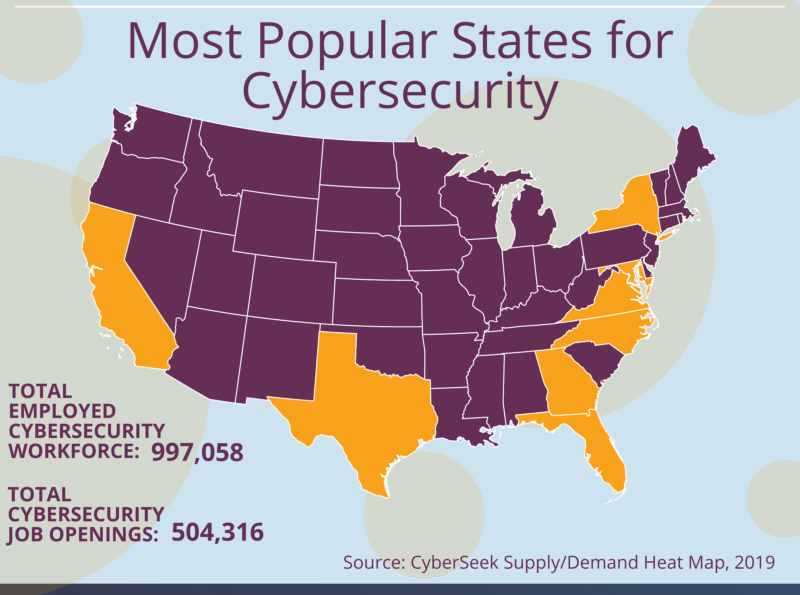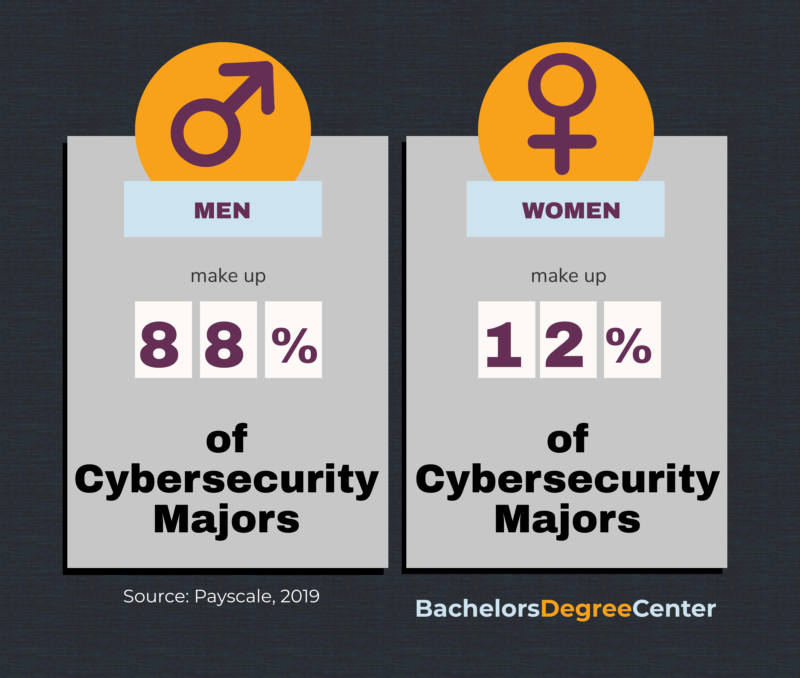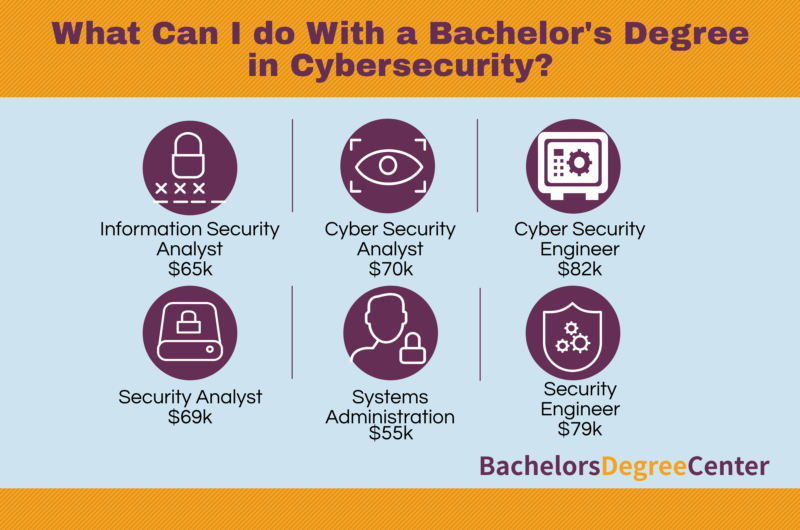Is a cyber security degree worth it? A cybersecurity degree can help someone enter into a career that can take them very far. The importance of network security and cyber security means a constant and still growing demand for cyber security professionals exists.
That occupational outlook means that anyone with a cybersecurity degree will always have the opportunity to find employment. In fact, the importance of network security and cyber security is so great, that someone with their degree and an entrepreneurial spirit can do well with starting their own business in the cyber security field.
What Is Cyber Security and Why Is So Important?
What is cyber security? Cyber security is a broad range of disciplines, practices, technologies, and methods rooted in computer science and specifically designed for the protection of network and data systems. It is impossible to understate the importance of network security and cyber security in the modern age.

Because the term cyber security represents such a large spectrum of practices, it allows for a lot of maneuverability for those who want to pursue a career in cyber security. The need for all people and businesses to secure important data and networks from attacks and vulnerabilities answers the question of is cyber security a good career.
When asking is cyber security a good career, it is important to note that cyber security is not something set in stone. Someone with a cybersecurity degree can continue to grow and branch out.
Continuing learning in the field is also important, which can also allow someone to stick out above other applicants when looking for a position. Tying a particular type of cyber security to a specific niche or industry can also work well for a cyber security professional.
Is a cyber security degree worth it in the long run? With so much scalability and potential, a cyber security degree can offer a graduate both an immediate return on their investment as well as future returns.
It is also important to differentiate a cyber security degree from a computer science degree. With computer science vs cybersecurity degree options, applicants should understand that one, computer science, deals with computers and computer systems in general. A cyber security degree will prepare someone for securing, monitoring, and policing computer systems and networks.
Why Is Cyber Security Important? Why Is Network Security Important?
To understand why a cybersecurity degree comes with so much versatility and opportunities, it is important to understand why is network security important. People, businesses, governments, and practically anybody doing anything these days rely heavily on IT systems.
Protecting these systems, the networks that connect them, and the data they contain is a high priority. A data breach or exploit can expose personal and financial data or render important systems inoperable. People and institutions need professionals who understand how these systems work to help them prevent costly or disastrous outcomes.
What Is the Difference Between Cyber Security and Network Security?
Terms like cyber security, network security, IT security, and information security can all show up meaning the same thing or entirely different things. Generally, there is a difference between cyber security and network security.
In practice, however, it is possible for the two terms to show up interchangeably. Still, it is a good idea to understand how the terms differ from each other. In this way, an applicant can look at a job description and know automatically which type of applicant a business is looking for.
Cyber security aims to defend a person’s or organization’s data, computer systems, or networks from illegal access and damage. Network security specifically deals with protecting a person’s or organization’s network infrastructure from unauthorized access or data manipulation.
In most cases, cyber security acts as a subset of information security, and network security acts as a subset of cyber security. So, when it comes to network security vs cybersecurity, it’s possible to think of network security as a specialization of cyber security. As stated, network security vs cybersecurity is not always an issue as a business looking for a network security specialist may well ask for a cyber security specialist and vice versa.
How Do I Find the Best Schools for Cyber Security Degrees? How Important is Accreditation?
When searching for the best schools and degree programs for cyber security, potential applicants will have to consider a number of things. One of the main selection factors will have to do with the accreditation status of the school or program in question.
Narrowing a search by accreditation accomplishes several things all at once. Since accreditation from a respected and known accrediting group implies adherence to standards and quality, choosing a program or school with an active accreditation status helps to determine which programs are worth an applicant’s time.

What Makes Accreditation So Important?
Accreditation is voluntary, which means an institution or program will submit their courses for evaluation from an independent group. That group will consist of educational peers and that group will make sure that the submitted institution or program adheres to quality standards.
Accreditation is not one and done. A school or program must continually meet standards, and when those standards change, that school or program must update its courses to reflect them. To gain an accredited status and keep it, the school or program must comply with all standards, undergo reviews and evaluations, and even submit to unannounced site visits.
If a school or program does not meet or exceed standards, or if they fall out of compliance, they lose their status. That is why it is important for applicants to ensure the accredited status of a program they are reviewing is current.
Employers, especially employers of people with a highly technical skillset like cyber security, will want applicants with accredited degrees. Because the industry often sets or helps to set the standards for these programs, an accredited cybersecurity degree will let them know that the applicant has the basic skills and knowledge to work in their sectors.
Understand that accreditation is not just about the cybersecurity degree program itself. Accreditation involves the staff, faculty, teaching methods, and goals of the institution.
Where Do I Start with Cybersecurity Accreditation?
A good place to start with cybersecurity accreditation is the regional accreditation of a college or university. Regional accreditation is granted by one of the designated accrediting bodies chosen the US Dept. of Education. These six accrediting groups grant accreditation status to the colleges and universities in their specific areas of influence, hence the term regional accreditation.
When looking at a college or university, that accreditation status should count as a baseline requirement before any other considerations. Regional accreditation is the most recognized type, which can make it easier to transfer credits between schools and make it easier to obtain financial aid.
However, regional accreditation tends to only go to a school as a whole. That is to say, the accredited school can be an excellent one, but the cybersecurity degree program offered by that school may not always represent the best an applicant can find. Because of this, there’s also specialized accreditation.
Specialized accreditation comes from an accrediting group that typically consists of business, professionals, and members within an industry or discipline. These groups can set standards that an entire industry will strive to adhere to. That is why specialized accreditation often falls under the category of national accreditation.
Specialized cybersecurity accreditation is very important because cybersecurity standards include very strict protocols and techniques. These standards are mainly set by the National Cybersecurity Center of Excellence or NCCoE. Other government-sponsored accreditation groups include the National Centers of Academic Excellence in Cyber Defense (CAE-CD, CAE-CO).
Non-governmental accrediting can come from the Accreditation Board for Engineering and Technology (ABET). If an applicant finds that a school or program has accreditation but does not know anything about the accrediting group, they can easily look them up and research whether that group offers benefits to the educational path they are interested in pursuing.
In most cases, the National Cybersecurity Center of Excellence consists of member groups or National Cybersecurity Excellence Partners (NCEPs). If an accrediting group is in a partnership with NCCoE, they are typically worth it.

What Are the Different Types of Cybersecurity Degrees?
As cybersecurity contains a broad range of specializations, it makes sense that there are several types of cybersecurity degrees. When choosing a cyber security undergraduate degree, an applicant should look at what that education will include and what types of specializations the curriculum will allow.
Applicants should also pay attention to the cyber security degree requirements. The cyber security degree requirements can vary depending on the type of cyber security undergraduate degree the applicant wants to pursue. For example, working with healthcare systems may come with very different cyber security degree requirements than working with general systems.
In addition, a cyber security undergraduate degree can have several different names depending on the path an applicant takes. For example, it is possible to find degrees listed as:
- Computer Forensics
- Cyber Security
- Cybercrime and Fraud Investigation
- Information Assurance
- Information Security
- Information Systems Security
- Network Security
Each of these degree types can represent a different cybersecurity concentration. Each of these degree types can also represent a need for different cyber security degree requirements and a different cyber security education requirement for each.
Can I Earn a Cybersecurity Degree Online?
Some of the best cyber security undergraduate programs are found online. Many cyber security education programs actually offer a lot more benefit when taken online because of the nature of the degree itself.
In addition, an online cyber security bachelor’s degree is just as relevant as a degree earned in a more traditional setting. As with choosing any school or program, finding the best cyber security undergraduate programs online will require applicants to pay close attention to the program’s reputation and accreditation status.
Pricing or tuition costs for online programs can vary just as much as equivalent college or university programs. The cheapest online cyber security degree can still hold a lot of value if it meets a cyber security education requirement set by a known and respected accreditation group.
Do I Need Certifications or Licenses in Cybersecurity?
Cyber security certifications vary widely. Graduates do not necessarily need any cyber security certifications, but having certification can help a lot in their careers. A cybersecurity graduate certificate alone shows that someone has the education to at least start with an entry-level position or as an assistant to management or supervisors.
However, many industries may want applicants to have cyber security certifications that show their competence for a particular specialization or aspect of cybersecurity. For example, many who enter into the network security field should have certifications that show they are competent and confident with administration of a company’s networking equipment and systems. Having certain cyber security certifications also boosts a resume as well as the value of a potential employee in the eyes of employers.
For example, for anyone working in network security, having the proper Cisco certification is sometimes a necessity. Many networks rely partially or completely on Cisco Systems and their equipment, so they will want applicants who have the proper Cisco certifications to work with those systems.
Applicants may earn some certifications during the course of their cyber security education. Graduating with certain certifications in hand can put an applicant way ahead of the pack when it is time to choose a career path. Some certifications worth considering immediately can include:
- CompTIA Certifications (Network+, Security+, CySA+, etc.)
- EC-Council Certifications:
- Certified Ethical Hacker (CEH)
- Certified Network Defense Architect (CNDA)
- Certified Information Systems Security Professional (CISSP)
- Licensed Penetration Tester
Many other types of certifications exist for those who want to take the next step beyond their degree.
A good rule of thumb for applicants is to always continue learning and improving. Some cyber security certifications are more important than others depending on the industry or job type. An applicant may have to pay for training and testing to earn these certifications. However, there are also free online security courses with certificates and cyber security certification online free to anyone who goes through the process.
Applicants should spend some time with any free online security course with certificates they can find. Those certifications can help them improve their knowledge, especially if they cover a niche subject.
A cybersecurity graduate certificate can often get someone into the door of a company, but adding more cyber security certifications can help boost somebody into positions that require someone with a little more knowledge of a particular field. If an applicant finds a cyber security certification online free of charge, they should definitely obtain it if it fits with their goals.
What Are Some Different Types of Careers in Cybersecurity?
There are a tremendous amount of cyber security jobs out there. In fact, a glance at a cyber security careers list may even seem a little overwhelming for applicants who do not know how to narrow it down to what they are looking for. Cyber security jobs exist in every industry, sector, and vertical. Basically, if someone makes use of a computer, network, or internet, then they have a need for a cyber security professional.

Cyber security jobs and network security jobs often overlap as well. Generally speaking, there are seven large categories of cyber security jobs and network security jobs. Within these categories there are many, many potential occupations. Some examples of cyber security jobs and network security jobs include:
- Cyber crime investigator
- Cyber instructor
- Cybersecurity management
- Forensic investigator
- Network operations specialist
- Security architect
- Software developer
- System administrator
- Systems developer
- Systems security analyst
- Technical support specialist
This list can go on for a while as there are a tremendous amount of cyber security jobs. When looking at a cyber security careers list, applicants will have to drill down to their core expertise to find the types of employment opportunities that fit their knowledge.
A popular choice for many cyber security professionals is cybersecurity management. Even under the umbrella term of cybersecurity management, there are a number of cybersecurity management jobs. Applicants may also see these opportunities listed as cybersecurity management and policy jobs.
Understand that cybersecurity management can mean a management position for any of the multitude of cybersecurity jobs in general. So, when it says cybersecurity management and policy, or cybersecurity management jobs, applicants should still drill down to their own core competencies to find the management position opportunities that fit their skills.
What Kind of Salary Can I Make with a Cybersecurity Degree?
It is not always easy to pin down a general cybersecurity degree salary. Cyber and network security salary can vary widely depending on the nature of the job, where the applicant applies, the company the applicant will work for, and the type of job.
When it comes to cyber security degree salary and network security salary, the title of the job can matter a great deal as well. Even in cases where someone performs virtually the same duty as someone else, the title of the position can mean a big difference in salary.
An easy example of this is to consider that a cyber security degree salary and a network security degree salary can vary greatly if both people with these titles worked in the same place. It would depend on how much value the employer places on the nature of the degree.
A cyber security specialist who presents themselves as a network security specialist may earn a lesser network security salary. At a different business, a network security salary may offer more money because that business puts a higher value on networking security specialists than general cybersecurity specialists.
Nevertheless, there are some salary figures offered for cyber security as a general field. According to Glassdoor, the average cyber security salary sits at $91.4k. PayScale lists the average pay for someone with the title of cyber security analyst as $75.7k. Indeed shows the average hourly rates for several positions under the cyber security category, and those rates range from $13/hour to $54/hour.
This all goes to show that cyber security salaries can vary widely and wildly. Once again, positions and titles can also factor into salary offers. As with most professions, experience can play an important role as well. For entrepreneurs, salaries can depend entirely on what kind of service they are offering and how they set their pricing for those services.
Are There Any Professional Organizations for Cybersecurity Professionals?
As a large and still growing profession, cyber security has quite a few professional organizations. Joining a professional organization not only makes a lot of sense, but it is something that students and graduates should consider essential to their careers. A professional cybersecurity group or organization offers a tremendous amount of value by way of opportunities and perks that not found elsewhere.
Maybe most importantly, a professional organization allows for the expansion of someone’s peer, personal, and professional network. The ability to network with peers, industry leaders, and others in the field is one of the most valuable benefits that come from joining a professional network.
Often, these organizations consist of people who make decisions concerning information and cyber security at local, state, national, and sometimes even international levels. This means it is possible to find new opportunities, offers, and education within a group long before these things become common knowledge.
Since cyber security is a fluid industry with changes happening all the time, it is important to stay on top of those changes. A professional organization helps with this in several ways. Some professional cyber security organizations include:
- Center for Internet Security – CIS
- International Information Systems Security Certification Consortium — (ISC)2
- National Cybersecurity Student Association — NCSA
- The SANS Institute
- Women in Cybersecurity – WiCyS
Many other cybersecurity organizations exist as well. Both students and graduates would do well to take a look at the organization to see which will fit their goals and join one or more of them as soon as possible.
Related Rankings:
25 Best Bachelor’s in Cyber Security Degree Programs
15 Best Online Bachelor’s in Cyber Security
